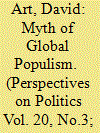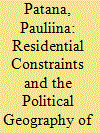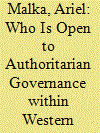|
|
|
Sort Order |
|
|
|
Items / Page
|
|
|
|
|
|
|
| Srl | Item |
| 1 |
ID:
186665


|
|
|
|
|
| Summary/Abstract |
Knowledge creation is a social enterprise, especially in political science. Sharing new findings widely and quickly is essential for progress. Scholars can now use Twitter to rapidly disseminate ideas, and many do. What are the implications of this new tool? Who uses it, how do they use it, and what are the implications for exacerbating or ameliorating existing inequalities in terms of research dissemination and attention? We construct a novel dataset of all 1,236 political science professors at PhD-granting institutions in the United States who have a Twitter account to answer these questions. We find that female scholars and those on the tenure track are more likely to use Twitter, especially for the dissemination of research. However, we consistently find that research by men shared on Twitter is more likely to be passed along further by men than research by women.
|
|
|
|
|
|
|
|
|
|
|
|
|
|
|
|
| 2 |
ID:
186666


|
|
|
|
|
| Summary/Abstract |
We explain how two landmark Supreme Court cases, Motor Vehicles Manufacturers Association of the U.S. v. State Farm Mutual Automobile Insurance Co. (1983) and Chevron U.S.A., Inc., v. Natural Resources Defense Council, Inc. (1984), have constrained congressional and presidential control of the bureaucracy. We provide an overview of these cases, and we note how the dominant theories of bureaucratic policy making in the political science literature fail to account for judicial doctrine in a meaningful way. We illustrate the implications of these cases for recent debates regarding regulatory rollbacks in the Trump administration, and we argue that bureaucratic control over the past forty years has tilted in favor of the judicial branch of American national government.
|
|
|
|
|
|
|
|
|
|
|
|
|
|
|
|
| 3 |
ID:
186669


|
|
|
|
|
| Summary/Abstract |
Mainstream political science literature on clientelism tends to focus on its supply side and on vote-buying, whereas ethnographic work often emphasizes client agency and incentives and paints a more diverse image of clientelism. We bridge the gap between these literatures by conducting a meta-analysis of ethnographic literature on clientelism from the client perspective. We code characteristics of clientelistic exchanges described in this work. We use cluster analysis and principal component analysis to systematize these data. Cluster analysis groups exchanges into three core subtypes of clientelism (“vote-buying”, “relational”, and “collective”); principal component analysis delivers two fundamental dimensions of clientelism: equal-unequal and individual-universal. We show that the two dimensions are associated with different aspects of client welfare and trade-offs from the client perspective. Our results reaffirm and reconcile existing deductive typologies of clientelism and can serve as a basis for a structured study of the demand side of clientelism.
|
|
|
|
|
|
|
|
|
|
|
|
|
|
|
|
| 4 |
ID:
186672


|
|
|
|
|
| Summary/Abstract |
I investigate whether wealthy democratic states should liberalize economic migration and, if so, on what terms. Is it permissible for the state to restrict economic migration as a form of labor market protection? If so, under what conditions? If not, why not? I argue that even granting that states have a right to control their borders and to prioritize the interests of their inhabitants, there is good reason to liberalize permanent low-skilled migration, so long as this is paired with appropriate social policies.
|
|
|
|
|
|
|
|
|
|
|
|
|
|
|
|
| 5 |
ID:
186670


|
|
|
|
|
| Summary/Abstract |
The political science discipline has recently engaged in contentious debate about the value of “research transparency,” particularly for research with human participants. The discipline is also holding vital conversations about research ethics and is rekindling dialogue about different ways of knowing. We offer an integrated account of how the actions that scholars who conduct human participant research take to respect ethical principles (which vary by research substance and settings), and their epistemological commitments (which vary across researchers), influence openness, a broader concept than “transparency.” These principles and commitments shape scholars’ openness practices simultaneously—both independently and in concert—serving as a prism through which multiple features of a research project are refracted, and resulting in a scholar’s inclination and ability to pursue openness in different ways and to different degrees with the audiences of her work. We also show how ethical principles and epistemological commitments can not only constrain and prevent openness, but also animate and require it. We suggest that scholars pursuing openness ethically, and in ways that honor their epistemological commitments, represents good social science, and we offer strategies for doing so. To develop our argument, we focus primarily on two research methods, ethnography and interviews, and on openness toward two audiences, human participants and research communities. Our account illuminates how the heterogeneity of human participant research makes it inappropriate, indeed impossible, to develop blanket rules for pursuing openness. Throughout, we highlight the importance of reflexivity for the ethical conduct of, and for being ethically open about, political science research.
|
|
|
|
|
|
|
|
|
|
|
|
|
|
|
|
| 6 |
ID:
186675


|
|
|
|
|
| Summary/Abstract |
We describe and analyze patterns in the geographical focus of political science research across more than a century. Using a new database of titles and abstracts from 27,690 publications in eight major political science journals from their inception, we demonstrate that, historically, political scientists concentrated their studies on a limited number of countries situated in North America and Western Europe. While a strong focus on Western countries remains today, we detail how this picture has changed somewhat over recent decades, with political science research becoming increasingly “globalized.” Still, several countries have received almost no attention, and geographical citation patterns differ by subfield. For example, we find indications of a greater focus on the United States and large Western European countries in international relations than in comparative politics publications. We also analyze several correlates of a country being the focus of political science research, including the country’s predominant languages, income, population size, democracy level, and conflict experience, and show systematic variation in the geographical focus of research. This unequal focus, we argue, has important implications regarding the applicability of extant descriptive and causal claims, as well as the development of theories in political science.
|
|
|
|
|
|
|
|
|
|
|
|
|
|
|
|
| 7 |
ID:
186660


|
|
|
|
|
| Summary/Abstract |
Why did we witness such a strong growth of anti-liberal forces twenty-five years after the triumph of liberalism? The answer is twofold. First, authoritarian populism has not sneaked into a given political space but is co-constitutive of a new cleavage in most modern societies. Authoritarian populists speak to the issues of this cleavage. Second, the rise of this new cleavage and authoritarian populists cannot be reduced to one of the two well-known explanations, namely the economic insecurity perspective and cultural backlash perspective. This current paper develops a political explanation that integrates struggles over policies with a focus on endogenous dynamics of political institutions in and beyond democracies. In this account, it is the historical compromise between labor and capital that has triggered a dynamic in which the rise of so-called non-majoritarian institutions (NMIs)—such as central banks, constitutional courts, and international organizations (IOs)—have locked in liberal policies in most consolidated democracies. This explanation brings together the party cartelization thesis with the observation that NMIs are a major target of contemporary populism. The explanatory model is probed by translating it into descriptive propositions and by showing step by step how the sequence unfolded in electoral democracies.
|
|
|
|
|
|
|
|
|
|
|
|
|
|
|
|
| 8 |
ID:
186664


|
|
|
|
|
| Summary/Abstract |
Populist discourse—which tends to benefit anti-systemic parties—has been on the rise in the world’s democratic states. Powerful non-democratic states have both the means and the incentive to spread such discourse to democratic states. We clarify the incentives illiberal states have to produce such communication, and delineate how this type of political communication fuses traditional state-to-state propaganda with election interventions. We draw on the case of Kremlin-sponsored communication on the issue of refugees in Germany to illustrate the mechanisms through which the discourse operates in target countries. We create a corpus of over a million news stories to identify the prevalence of illiberal discourse and its timing relative to Germany’s elections. We show that the Kremlin intervened in the 2017 federal elections by promoting refugee stories over and above the rate at which German outlets did. We discuss the broader implications for the use of directed political communication as a form of election intervention.
|
|
|
|
|
|
|
|
|
|
|
|
|
|
|
|
| 9 |
ID:
186668


|
|
|
|
|
| Summary/Abstract |
The electoral connection incentivizes representatives to take positions that please most of their constituents. However, on votes for which we have data, lawmakers vote against majority opinion in their district on one out of every three high-profile roll calls in the U.S. House. This rate of “incongruent voting” is much higher for Republican lawmakers, but they do not appear to be punished for it at higher rates than Democrats on Election Day. Why? Research in political psychology shows that citizens hold both policy-specific and identity-based symbolic preferences, that these preferences are weakly correlated, and that incongruous symbolic identity and policy preferences are more common among Republican voters than Democrats. While previous work on representation has treated this fact as a nuisance, we argue that it reflects two real dimensions of political ideology that voters use to evaluate lawmakers. Using four years of CCES data, district-level measures of opinion, and the roll-call record, we find that both dimensions of ideology matter for how lawmakers cast roll calls, and that the operational-symbolic disconnect in public opinion leads to different kinds of representation for each party.
|
|
|
|
|
|
|
|
|
|
|
|
|
|
|
|
| 10 |
ID:
186662


|
|
|
|
|
| Summary/Abstract |
Political scientists have long asserted that populists use simpler language than their mainstream rivals to appeal to ordinary people and distance themselves from elites. However, there is little comparative evidence in support of that claim. In this study, we investigate the linguistic simplicity of four right-wing populists compared to their principal opponents in the United States, France, United Kingdom, and Italy. We do so by analysing a corpus of approximately one million words from leaders’ speeches, using a series of linguistics measures for evaluating simplicity. Contrary to expectations, we find that Donald Trump was only slightly simpler than Hillary Clinton, while Nigel Farage in the UK and Marine Le Pen in France were more complex than their main rivals, and Italy’s Matteo Salvini was simpler on some measures but not others. We conclude that the simple language claim is not borne out and that other aspects of the received wisdom about populism should be re-examined.
|
|
|
|
|
|
|
|
|
|
|
|
|
|
|
|
| 11 |
ID:
186674


|
|
|
|
|
| Summary/Abstract |
The recent politics of demographic anxiety has been shaped by an influential New Right argument: a) that Western nations are experiencing an immigration crisis that threatens their cultural integrity (i.e., a “Great Replacement”), and b) that this crisis is fueled by the egalitarian commitments of liberalism. Accordingly, in this essay I engage core figures of the New Right to pursue two lines of analysis. At one level, I interrogate the asserted connection between egalitarian ideals and the demographic shifts associated with globalization. In doing so, I take on the “metapolitics” of the New Right. This “metapolitical” project does not simply diagnose the roots of population change; instead, it transforms shared normative languages in order to pursue ethnonationalist and ethnopopulist aims. My overriding argument is that this “Gramscianism of the Right” (whether pursued by the New Right or its identitarian allies across Europe and North America) does not simply turn liberal normative vocabularies toward antiliberal objectives. Rather, this metapolitical strategy ultimately hollows out the normative substance of the terms it takes over, with deleterious consequences for a democratic public.
|
|
|
|
|
|
|
|
|
|
|
|
|
|
|
|
| 12 |
ID:
186673


|
|
|
|
|
| Summary/Abstract |
The “rise of global populism” has become a primary metanarrative for the previous decade in advanced industrial democracies, but I argue that it is a deeply misleading one. Nativism—not populism—is the defining feature of both radical right parties in Western Europe and of radical right politicians like Donald Trump in the United States. The tide of “left-wing populism” in Europe receded quickly, as did its promise of returning power to the people through online voting and policy deliberation. The erosion of democracy in states like Hungary has not been the result of populism, but rather of the deliberate practice of competitive authoritarianism. Calling these disparate phenomena “populist” obscures their core features and mistakenly attaches normatively redeeming qualities to nativists and authoritarians.
|
|
|
|
|
|
|
|
|
|
|
|
|
|
|
|
| 13 |
ID:
186659


|
|
|
|
|
| Summary/Abstract |
You cannot be a political science journal editor these days without being inundated with manuscripts on populism. A high percentage of these start with the lament that despite its widespread use, there is no consensus over what populism is, that it is conceptually imprecise, and difficult to define. What usually follows is a discussion of several different influential conceptual works. This often begins with Laclau’s notion of populism as a countermovement to the failure of democratic representation under neo-liberal capitalism (Reference Laclau2005). After dancing around Laclau’s arguments about populism, popular sovereignty, and what constitutes democracy, most writers, ultimately, get around to Mudde’s widely cited definition and often adopt a version of it:
|
|
|
|
|
|
|
|
|
|
|
|
|
|
|
|
| 14 |
ID:
186676


|
|
|
|
|
| Summary/Abstract |
The greatest threat of democratic breakdown stems from the federal structure of the US Constitution and from false claims of election fraud with the potential for state- or congressional- level reversals of popular vote outcomes. The potential for such a breakdown was revealed by the events of January 6, 2021, with tens of millions of voters still believing in the big lie and the repetition of that lie by legislators and government officials. It is exacerbated by hyperpolarization, minoritarian control caused by partisan gerrymandering for state legislative districts and in the US House, malapportionment in the US Senate, and the highest likelihood of Electoral College reversals of popular vote outcomes in more than a century. Democratic breakdown is also made more likely by recent legislation that makes it easier for legislators in some gerrymandered states to reverse the outcomes of the popular vote in their states.
|
|
|
|
|
|
|
|
|
|
|
|
|
|
|
|
| 15 |
ID:
186663


|
|
|
|
|
| Summary/Abstract |
What explains variation in populist radical right (PRR) support within Western democracies? Specifically, why is contemporary PRR support often and increasingly stronger in areas seemingly detached from the effects of globalization, transnationalism, or immigration, the key issues these parties emphasize? This study articulates a theory of residential constraints to deepen understanding of these spatial patterns. I hypothesize that when citizens are residentially constrained—that is, when their means of reacting to local conditions and “voting with their feet” are limited—they are more likely to support PRR parties. To test this claim, I use a multimethod research design and exploit both quantitative and qualitative evidence from France, an important case of long-standing and geographically divided PRR support. I demonstrate that the PRR performs well in areas where locals’ access to services and opportunities is compromised and where opportunities and incentives to relocate are blocked by residential constraints. Residential constraints thus generate a set of relative economic grievances and render them highly salient in localities that may otherwise appear unaffected by more objective hardships and structural decay.
|
|
|
|
|
|
|
|
|
|
|
|
|
|
|
|
| 16 |
ID:
186671


|
|
|
|
|
| Summary/Abstract |
Since 2008, the number of people in the United States making small monetary donations to political causes, both within and beyond electoral politics, has skyrocketed. While critics of “big money” in politics laud these donations because they are small, proponents of small-scale democratic political action eye them suspiciously because they are monetary. Neither group interrogates whether the monetariness of these donations might be a source of their democratic potential. Building on Wendy Brown’s conceptual distinction between monetization and economization, I argue that small-money political donations are potentially democratic not only because they are small, but also because they are monetary. More specifically, the mobility, divisibility, commensurability, and fungibility of money help make small-money political donations potentially democratic, by making them potentially accessible, non-intrusive, and collective. Money is the coin of the economic realm, but it can also be a currency of democratic politics.
|
|
|
|
|
|
|
|
|
|
|
|
|
|
|
|
| 17 |
ID:
186661


|
|
|
|
|
| Summary/Abstract |
Recent events have raised concern about potential threats to democracy within Western countries. If Western citizens who are open to authoritarian governance share a common set of political preferences, then authoritarian elites can attract mass coalitions that are willing to subvert democracy to achieve shared ideological goals. With this in mind, we explored which ideological groups are most open to authoritarian governance within Western general publics using World Values Survey data from fourteen Western democracies and three recent Latin American Public Opinion Project samples from Canada and the United States. Two key findings emerged. First, cultural conservatism was consistently associated with openness to authoritarian governance. Second, within half of the democracies studied, including all of the English-speaking ones, Western citizens holding a protection-based attitude package—combining cultural conservatism with left economic attitudes—were the most open to authoritarian governance. Within other countries, protection-based and consistently right-wing attitude packages were associated with similarly high levels of openness to authoritarian governance. We discuss implications for radical right populism and the possibility of splitting potentially undemocratic mass coalitions along economic lines.
|
|
|
|
|
|
|
|
|
|
|
|
|
|
|
|
|
|
|
|
|